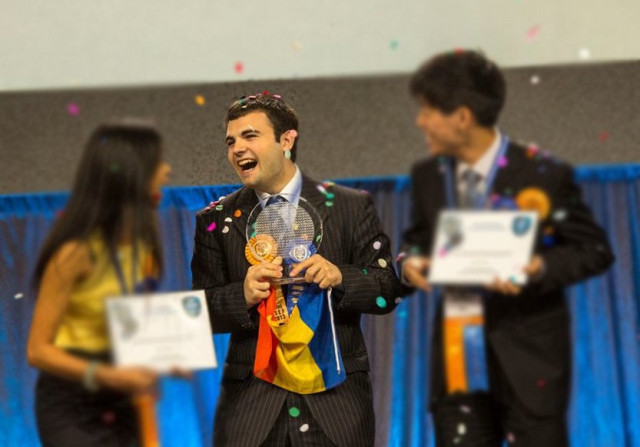Romanian student’s AI-driven car drives him to pole position at ISEF
Teen builds a car that equals Google’s attempt, but is considerably cheaper.

Budisteanu, a 19-year-old student from Romania who won the first prize at the Isef, has made a viable model for a low-cost, self-driving car using artificial intelligence (AI). PHOTO: facebook.com/societyforscience
Budisteanu, a 19-year-old student from Romania who won the first prize at the Intel International Science and Engineering Fair (Isef), has made a viable model for a low-cost, self-driving car using artificial intelligence (AI).
According to the World Health Organization, car accidents cause 1.24 million deaths annually worldwide. Moreover, 90% of deaths in road accidents occur due to human error, according to the International Organization for Road Accident Prevention. An automobile driven by AI can considerably decrease car accidents.

Google created the world’s first self-driving car earlier but the high cost in building the technology made it too expensive for commercial or public use. The car used a three dimensional (3D) radar system which cost nearly $75,000. But, Budisteanu has resolved that problem and made a model that costs approximately $4,000.
The teen scientist has used a minimal 3D radar system and special cameras for his invention. Parallel and distributed algorithms use AI to recognise traffic signs, demarcation lanes and the vehicle’s position, among other things. The new self-driving car model will also allow more people with disabilities to drive.
Budisteanu won $75,000 at the Intel Isef award ceremony on Friday. The fair held in Phoenix, Arizona from May 12–17 drew 1,600 young scientists from 70 countries, territories and regions around the world.
But the most extraordinary award was from the Massachusetts Institute of Technology’s Lincoln Laboratory which announced that the names of the first and second place category award winners will be submitted to the International Astronomical Union for naming of a minor planet. So far, less than 15,000 asteroids have been named.
More than 400 Intel Isef competitors received scholarships and prizes for their innovative research. The awards amount to a total of $4 million in scholarships and prizes.
The runners-up were two students Eesha Khare, 18, from California and Henry Wanjune Lin, 17, from Louisiana. Khare had developed a device that fits inside cellphone batteries, allowing them to fully charge within 20-30 seconds, therefore reducing the use of power dramatically. Khare’s invention also has potential applications for car batteries.
Wanjune, meanwhile, had provided scientists with valuable new data by simulating thousands of clusters of galaxies. This will allow scientists to better understand astrophysics, including dark matter, dark energy and the balance of heating and cooling in the universe’s most massive objects.
The runners-up received a cash award of $50,000.
Thousands of teachers and students from across the globe attended the event, while some watched the ceremony from the edge of their chairs, others mumbled prayers in a corner.
An obviously ecstatic Wendy Hawkins, executive director of the Intel Foundation, and Elizabeth Marincola, president of Society for Science and the Public, announced and presented the awards to top winners. Neither of them, however, took the students’ time. While Hawkins did not make a speech at the closing, Marincola took a few extra seconds to thank all concerned.
“Your passion for science transcends differences in nationality and language,” Marincola said. “You can take us to places we have never been.”
Last year, Jack Andraka won the first prize at the Intel Isef for making a test for the early detection of pancreatic cancer.
Published in The Express Tribune, June 4th, 2013.
Like Business on Facebook to stay informed and join in the conversation.



















COMMENTS
Comments are moderated and generally will be posted if they are on-topic and not abusive.
For more information, please see our Comments FAQ